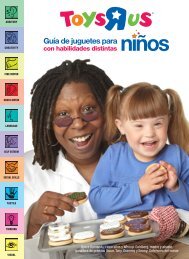English
English
English
You also want an ePaper? Increase the reach of your titles
YUMPU automatically turns print PDFs into web optimized ePapers that Google loves.
Top Ten Tips for Buying Toys<br />
Prepared by the National Lekotek Center<br />
Selecting a toy for a child who has a disability? Here are the questions the play experts at the<br />
National Lekotek Center ask when choosing developmentally appropriate toys for kids with<br />
special needs. Use these questions to guide you in making the right match between the child<br />
for whom you’re buying and the toys in the Toys“R”Us Toy Guide for Differently-Abled Kids.<br />
1. MULTI-SENSORY APPEAL<br />
Does the toy respond with lights, sounds or movement to engage the child?<br />
Are there contrasting colors? Does it have a scent? Is there texture?<br />
2. METHOD OF ACTIVATION<br />
Will the toy provide a challenge without frustration? What is the force required to activate?<br />
What are the number and complexity of steps required to activate?<br />
3. PLACES THE TOY WILL BE USED<br />
Will the toy be easy to store? Is there space in the home?<br />
Can the toy be used in a variety of positions such as side-lying or on a wheelchair tray?<br />
4. OPPORTUNITIES FOR SUCCESS<br />
Can play be open-ended with no definite right or wrong way?<br />
Is it adaptable to the child’s individual style, ability and pace?<br />
5. CURRENT POPULARITY<br />
Is it a toy that will help the child with special needs feel like “any other kid?”<br />
Does it tie in with other activities, like books and art sets, that promote other forms of play?<br />
6. SELF-EXPRESSION<br />
Does the toy allow for creativity, uniqueness and making choices?<br />
Will it give the child experience with a variety of media?<br />
7. ADJUSTABILITY<br />
Does it have adjustable height, sound volume, speed and level of difficulty?<br />
8. CHILD’S INDIVIDUAL ABILITIES<br />
Does the toy provide activities that reflect both developmental and chronological ages?<br />
Does it reflect the child’s interests and age?<br />
9. SAFETY AND DURABILITY<br />
Does the toy fit with the child’s size and strength? Does it have moisture resistance?<br />
Are the toy and its parts sized appropriately? Can it be washed and cleaned?<br />
10. POTENTIAL FOR INTERACTION<br />
Will the child be an active participant during use?<br />
Will the toy encourage social engagement with others?<br />
The toys featured in the Toys“R”Us Toy Guide for Differently-Abled Kids<br />
have been selected and evaluated by the National Lekotek Center, a<br />
nonprofit organization dedicated to making play accessible for children<br />
with disabilities. For assistance in selecting toys or play activities for<br />
a child who has disabilities, please visit the Lekotek website at:<br />
www.lekotek.org<br />
Shop: In-store | Online: Toysrus.com/DifferentlyAbled 3<br />
Top Ten Tips for Buying Toys



